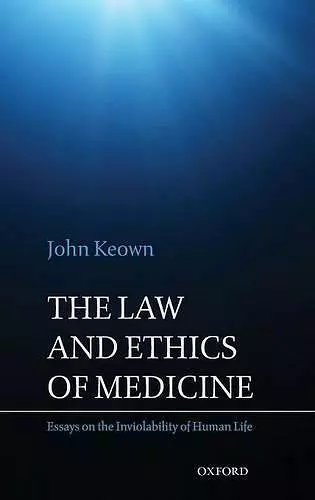The Law and Ethics of Medicine
Essays on the Inviolability of Human Life
Format:Hardback
Publisher:Oxford University Press
Published:26th Apr '12
Currently unavailable, and unfortunately no date known when it will be back

IAHPC Palliative Care Book of the Month - November 2013
The principle of the sanctity of life is key to the law governing medical practice and professional medical ethics. It is also widely misunderstood. This book clarifies the principle and considers how it influences the law governing abortion; 'test-tube' babies; euthanasia; feeding patients in persistent vegetative states; and palliative treatment.The Law and Ethics of Medicine: Essays on the Inviolability of Human Life explains the principle of the inviolability of human life and its continuing relevance to English law governing aspects of medical practice at the beginning and end of life. The book shows that the principle, though widely recognized as an historic and foundational principle of the common law, has been misunderstood in the legal academy, at the Bar and on the Bench. Part I of the book identifies the confusion and clarifies the principle, distinguishing it from 'vitalism' on the one hand and a 'qualitative' evaluation of human life on the other. Part II addresses legal aspects of the beginning of life, including the history of the law against abortion and its relevance to the ongoing abortion debate in the US; the law relating to the 'morning after' pill; and the legal status of the human embryo in vitro. Part III addresses legal aspects of the end of life, including the euthanasia debate; the withdrawal of tube-feeding from patients in a 'persistent vegetative state'; and the duty to provide palliative treatment. This unique collection of essays offers a much-needed clarification of a cardinal legal and ethical principle and should be of interest to lawyers, bioethicists, and healthcare professionals (whether they subscribe to the principle or not) in all common law jurisdictions and beyond.
John Keowns excellent book The Law and Ethics of Medicine is primarily the work of a lawyer and is written with lawyers and judges in mind; yet few books on the law of medicine are as conversant in important topics of contemporary ethics, especially questions of double effect, the nature of the human act, and the value of human life. * Christopher Tolle fsen, Journal of Moral Philosophy *
If you only have one book on your shelf about medical law, this should be it. * Christopher Kaczor, The Public Discourse *
[Keown's] attention to detail and clarity of thought are admirable, but he writes in a moderate and reasoned tone and in a manner easily understood whether you are a health care professional, lawyer, politician or just an interested member of the public. The Law and Ethics of Medicine is no exception and is recommended to anyone involved in the discussions about physician-assisted death and perhaps to those thinking about better strategies for advancing palliative care. * Roger Woodruff, IAHPC News *
This recent volume by John Keown is a bijou of consistency and rationality. Based on the study of numerous legal documents and cases, it fuses passion with rigor, depth with simplicity, complexity with clarity....Keown offers to his readers an excellent tool and resource to think in-depth about one of th emost significant issues of nowadays: the value of human life. * Marina Casini, Medicine, Health Care & Philosophy *
[A] helpful resource. The Law and Ethics of Medicine... is not designed primarily to persuade, but rather to clarify. Keown's project is to clear away obstructions that have gathered around the keystone principle of the inviolability of human life, so that the thing itself comes into view. In this, Keown succeeds. * Adam J MacLeod, Adelaide Law Review *
ISBN: 9780199589555
Dimensions: 241mm x 163mm x 30mm
Weight: 780g
416 pages